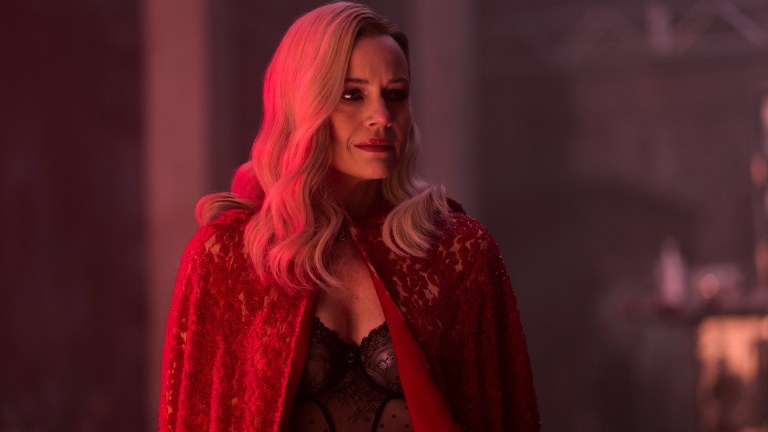The Fall of the House of Usher’s Verna Is Not What You Think
Carla Gugino's Verna is equal parts an Edgar Allan Poe creation and a Mike Flanagan original in The Fall of the House of Usher.

This article contains spoilers for Netflix’s The Fall of the House of Usher.
As its title suggests, Mike Flanagan’s latest project for Netflix, The Fall of the House of Usher, is an intensely Edgar Allan Poe affair. The eight-episode series, which follows the modern day rise and fall of fictional opioid giant Fortunato Pharmaceuticals, is based on not only Poe’s epic “The Fall of the House of Usher” but many of his other seminal classics as well.
Fittingly, pretty much every character on the show is named after an Edgar Allan Poe creation. These range from the blindingly obvious (Bruce Greenwood’s Roderick Usher and Mary McDonnell’s Madeline Usher) to the less obvious (Katie Parker’s Annabel Lee) to the downright obscure (T’Nia Miller’s Victorine LaFourcade). One of The Fall of the House of Usher‘s most important characters, however, doesn’t appear to have any Poe origins … at least not at first glance.
Carla Gugino’s Verna is unquestionably the big bad of The Fall of the House of Usher. Her mysterious and ageless character sets events in motion that will eventually lead to the fall of the aforementioned House of Usher. While she is distinctly evil and uniquely Poe, there is no character named “Verna” anywhere in the writer’s canon. Thankfully, by using some context clues and sophisticated anagram technology, we can safely determine that Verna is meant to symbolize the iconic titular corvid in Poe’s “The Raven.” Indeed, “Verna” is even an anagram for “Raven.” If you feel silly for not catching that yet, imagine how I felt upon watching all eight episode screeners, stewing on them for weeks, and only just coming to that realization hours after the show actually premiered. Sometimes, the most obvious things are the hardest to catch.
Anywho, it’s fair to conclude that Verna fulfills the role of the Raven in Mike Flanagan’s ode to Edgar Allan Poe. In addition to that anagram, the show continually implies that Verna just straight up transforms into a raven on several occasions. But the answer as to who or what Verna really is and what role she fulfills in the story isn’t that simple. Yes, she’s a metaphorical and literal raven, but she’s also much more.
In addition to associating Verna with nature’s most Gothic bird, The Fall of the House of Usher also makes it quite clear that Verna is a demon of sort sort – perhaps even the devil herself. Verna is clearly a supernatural being. In her finale conversation with Usher lawyer Arthur “The Pym Reaper” Pym (Mark Hamill), Verna mentions “coming up” to Earth from somewhere and being fascinated with human beings.
Verna also likes to make Faustian bargains with very bad people. Before the Usher family cut a deal with the literal devil, Verna also worked with powerful (and frequently loathsome) real life figures like the Mark Zuckerberg, Mitch McConnell, Donald Trump, Prescott Bush, John Francis Queeny (founder of Monsanto) the Koch family, the Hearsts, the Rockefellers, the Vanderbilts, and more. All of these individuals and families sold their soul to Verna for power, just like Roderick and Madeline Usher once did.
Verna as a literal demonic figure works quite well in The Fall of the House of Usher. Roderick and Madeline’s agreement with Verna raises some fascinating questions as to what they even really accomplished. Yes, Verna said she could make all of their dreams come true but weren’t Roderick and Madeline’s dreams en route to becoming true anyway? Rufus Griswold (Michael Trucco) was dead, his body was never going to be found, and Fortunato Pharmaceuticals was ripe for the taking. They don’t call it a “deal with the devil” because you made an actual equitable deal with the devil. They call it a deal with the devil because the devil is always going to get the best of you somehow.
So why even bother with Verna as a raven in The Fall of the House of Usher? For one, no story that’s seeking to capture all of the Poe experience can leave The Raven out. It’s unquestionably his most well-known work and one of the best poems in American literary history. But more importantly than that, Flanagan’s recasting of the raven as the devil reveals that he might have an interesting interpretation of poem itself.
If you’ve never read The Raven, please rectify that. It rules. Once you have, you may be surprised to discover that there isn’t much of a narrative in there at all. The poem essentially follows an unnamed narrator as he mopes around his spooky home and despairs over the loss of his beloved “Lenore.” Then a raven turns up to either actively taunt said narrator or simply parrot his own misery back to him. Based on what Flanagan presents in The Fall of the House of Usher, his vision of the beast not only has agency in mocking the narrator but is probably even partially responsible for his pain.
After all, it’s not much of a stretch since the narrator says of the raven “And his eyes have all the seeming of a demon’s that is dreaming.” What is The Fall of the House of Usher if not one demon’s dream?
All eight episodes of The Fall of the House of Usher are available to stream on Netflix now.
